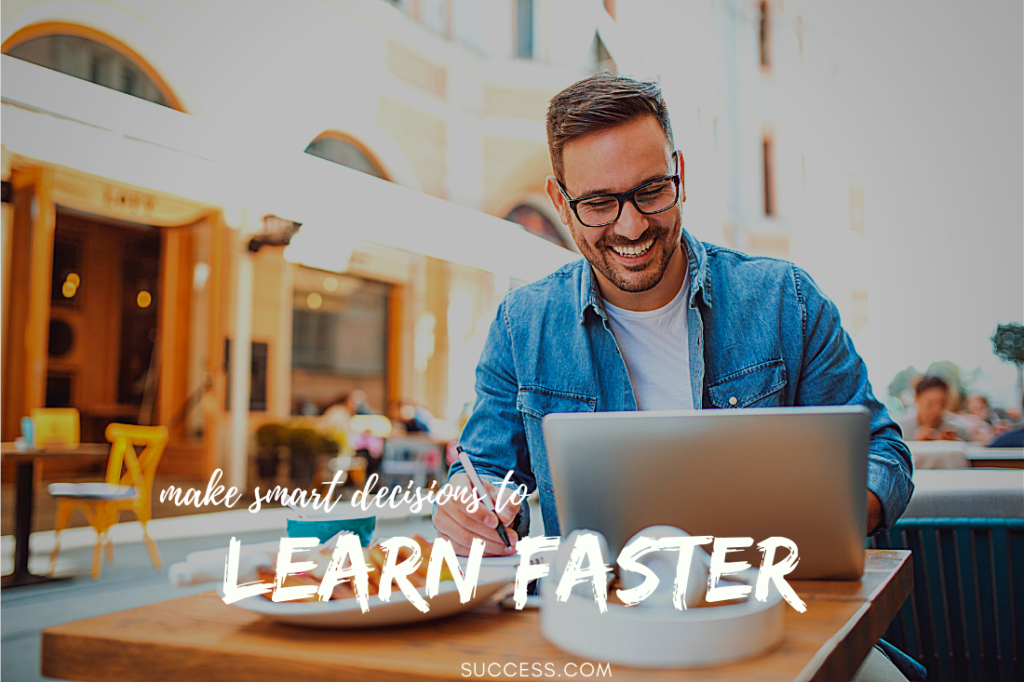To become a high performer, you have to learn faster. How do you do that?
Let me tell you first what not to do, because a lot of people just jump in and say, “I’m going to learn faster. I want to learn speed reading. I want to learn a new language. I want to learn all these new skills…”
And what’s happening is that people are very transient with their learning goals. What do I mean by that? I mean they’re kind of phony about it. They really don’t want to learn.
They say I’d like to learn this, I’d like to learn that. Someday, I’d like to learn French. Someday, I’d like to learn photography. Someday, I’d like to blog… and they never actually learn it, because learning doesn’t happen someday—it has to happen consistently.
Related: 3 Techniques to Never Stop Learning
If we’re really going to get to the point where you learn something faster, we have to approach learning itself differently. It can’t be these one-off, little goals of little things we want to learn. That doesn’t work for people. They don’t stay consistent. There has to be a broader vision for who they are and what they want their life to be about.
If you’re going to stay on a learning habit, then you have to have a bigger vision for yourself.
1. Connect your life goals with what you want to learn.
If you want to learn something faster, you must first know the connection between your learning goals and your dream life.
I tell people all the time, don’t just come up with things you want to learn, because guess what, we want to learn everything. Everyone wants to learn 50 new things immediately, but no one ever learns anything. Why? Because it’s not real for them—it’s a transient desire. If you want to become a great learner, it has to be attached to a dream life of yours, a true lifestyle that you see for yourself.
You have to know what you want of your life before you become a master learner.
Until I know what I want my life to be about, what I want to experience on a daily basis, what I want my dreams to be or who I want to be, I don’t know WHAT to learn. I’m just going to be curious about things and then I’ll dabble in them.
But the path to true mastery is the part where we say, “What do I want my life to be about?” Let me develop the knowledge, the skills, the competencies, the capabilities to build into that life. And that’s where you get someone who becomes a master learner.
You won’t know what to learn and what competencies and capabilities to develop until you know what your mission is. Otherwise you’re just playing around with skills. You’ll play around with learning something but you’ll never immerse yourself into them.
So once you know what you want your life to be about, what your passions are, you’ll learn what you have to learn along the way, and then everything changes.
I’m not saying you have to know your ultimate purpose in life before you can learn anything. I’m just saying if you want to learn faster, start figuring out that purpose, start figuring out your direction, and you’ll learn a lot faster.
2. Follow an example. Don’t reinvent the wheel.
If you want to learn something, you need to be able to model something. You need to be able to see somebody who’s already done it. You need to be able to read about somebody who’s already done it. You need to experience somebody who’s already done it.
The worst thing you can do in learning is start from scratch. With no foundation of what’s worked before, you’re just making stuff up, which is the slowest way to learn.
The wheel was invented a couple thousand years ago as you know, so the worst thing you can do is say, “Let me start trying a bunch of stuff.” That’s not learning; that’s called being an idiot, and being an idiot is about bumbling through life without realizing someone has already done it for you.
So go read a book about somebody who’s done what you want to do. Take a course from someone who has already accomplished what you want to accomplish. Follow someone’s online thing about who’s already done what. There are so many examples for you to learn from, and it has to begin with that.
3. Make it a practice.
You have to make a consistent practice out of mastering skillsets.
Related: 5 Deliberate Steps to Master a Skill
What does that mean? I mean daily exposure and immersion into what it is you’re trying to learn.
If you’re going to try to learn piano, you aren’t going to learn it by going to piano lessons once a month. If you want to learn French, you aren’t going to learn it by talking to somebody who speaks French once a month or even once a week. It has to be more than that.
If you want to learn something, you have to deeply immerse yourself in it over a long period of time. It can’t be a weekend event or seminar. It can’t be a one-time course. It has to be something you get into.
For my personal development, I read a book a week on personal development, and I’ve done it for 17 years straight, never missing a week. It was dedication to me. I was going to learn it. I was going to master my life. I was going to learn to master my mind, master my relationships, master my finances and master my health. It was so important to me that I made it a daily reality.
If you’re someone who’s saying, “I can’t give every day to learning something,” then great! You’re giving every day to the steady decline of your competencies!
Don’t tell me you can’t do something every day to learn and grow. If you don’t feel like you can take some time every day to learn and grow then you’re mismanaging your life.
I think that what’s lacking for a lot of people right now is that they have a disconnection or disassociation from any sense of mastery in their life. Because if we’re not mastering something and working toward getting better at something, then we’re never going to have a sense of progress. And if we never have a sense of progress, then we’ll never experience that deep satisfaction, fulfillment, joy or happiness that comes from being excellent at something.
So you have to practice something constantly, at some level every day. And people will go, “Wow, how did you get so good at this?” You’ll tell them, “I worked at it. Every day.”
That’s why there’s no mystery. I got good at it because I did it every day. It’s immersion and consistency in a practice, a habit of learning that very thing that you have a goal for and a dream life for.
4. Get feedback to grow.
If you want to become a world-class athlete, then you need a coach. If you want to become a world-class person at whatever you’re doing, you need someone to look at it and give you feedback. Maybe it’s a mentor who gives you feedback on presentations. Maybe it’s a friend of yours who has a discriminating eye, who can look at things and give good, valuable constructive feedback, and you say, Hey, before I send this out could you look at it?
It’s about getting feedback, whether it’s from a friend, family, spouse, just someone who can look at what you’re going to contribute to the world first and say, “Try this. I like this or I don’t like this.”
There are some things that can destroy learning, and that is when people are so brutal in their feedback or they’re so judgmental about something that it stops your learning. If it came from a dark place and a mean person, then don’t listen to it. There’s nothing relevant there because it’s from the wrong space. It shouldn’t mean anything to you when people are harsh to you and they don’t know you.
But if someone does know your heart, they know who you are and they give you feedback, but you don’t like the way it was delivered or you feel they were too confrontational or rude, don’t listen to the emotion of what they’re delivering or what it feels like. Instead, ask, “Is the content of what they’re saying relevant or capable of improving my learning and my mastery?”
If it is, then you have to take the content for what it’s worth. Find the nugget of wisdom they gave you, even if it was wrapped in a big turd. (Feel free to quote me on that.) There’s probably something there where you can say, “That is relevant, and if I apply that I can probably get better.” That’s vital.
5. Have a deadline.
How fast do you need to learn that? How fast do you need to master that? Is it something you’re going to master this month, this year, this next decade?
Without a timeline for developing your competencies, you’ll never act or you’ll fall off track. No deadline means guaranteed distraction. So, WHEN do you need to learn this new topic or reach the next level of skill? What’s the consequence if you don’t learn it by then? Knowing the answer to these two questions will accelerate your learning.
- You know what you need to learn.
- You have people you can learn it from.
- You can practice it with these habits.
You can get feedback from these types of people and experiences. - You know you have to do it and get good at it at this certain timeframe.
Follow these things and you will start to learn faster. You’ll be more engaged with your life. You’ll have more enthusiasm for learning. You’ll notice things more. You’ll feel like you’re growing and be more satisfied with your life.
Related: How to Start a New Discipline
A version of this post originally appeared on BrendonBurchard.tumblr.com.




